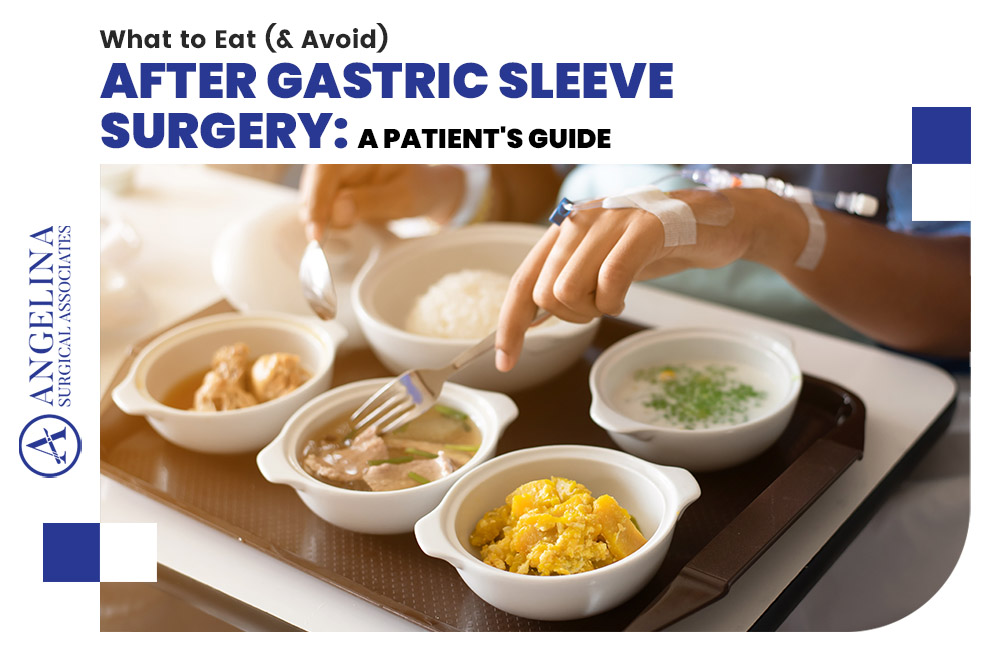Overview: Learn what to eat and avoid after gastric sleeve surgery. Our patient guide helps you heal, stay nourished, and build long-term healthy habits!
Undergoing gastric sleeve surgery is a major step toward long-term health and sustainable weight loss. But the surgery itself is only part of the journey — the real transformation begins with how you nourish your body afterward.
As a surgical team that regularly supports patients through this life-changing process, we know that understanding what to eat and what to avoid is crucial for healing, comfort, and lasting results.
The Early Recovery Stage: Liquids First
For the first 1–2 weeks after surgery, your stomach is still healing. During this phase, it’s essential to avoid stretching the sleeve and to stay hydrated.
Focus on:
-
Clear broths (low-sodium)
-
Sugar-free gelatin or popsicles
-
Water, electrolyte drinks, and decaf tea
-
Protein-based liquids such as bone broth or whey isolate shakes
Avoid:
-
Sugary beverages
-
Carbonated drinks (can cause painful gas and bloating)
-
Caffeinated or acidic beverages (like coffee or citrus juice)
Take small, slow sips throughout the day, rushing your intake can lead to nausea, discomfort, or vomiting.
Transitioning to Pureed Foods
Around week 3 or 4, your surgeon will likely clear you to begin a pureed or soft food diet. The goal here is to reintroduce gentle nutrition while protecting your healing stomach.
Good options include:
-
Smooth pureed lean meats (chicken, turkey, or fish)
-
Scrambled or soft-boiled eggs
-
Greek yogurt (low-fat and unsweetened)
-
Mashed vegetables or pureed soups
-
Cottage cheese or protein-rich smoothies
Remember to eat slowly, chew thoroughly, and stop when you feel full — even if it’s just a few bites. Overeating too soon can strain your stomach or cause reflux-like symptoms.
Reintroducing Solid Foods
At around 4–6 weeks post-surgery, you’ll gradually move to more solid textures under your surgeon’s or dietitian’s supervision.
Focus on:
-
Lean proteins: chicken, fish, eggs, tofu
-
Cooked vegetables
-
Small portions of fruit (without peels)
-
Whole grains like quinoa or oatmeal (in moderation)
Avoid:
-
Fried foods and high-fat meats
-
White bread, pasta, and rice (they can expand in your stomach)
-
Tough or dry meats
-
Sugary snacks and desserts
-
Alcohol and carbonated beverages
Keep protein at the center of your plate — your smaller stomach can only handle limited food volume, so every bite should count nutritionally.
The Importance of Vitamins and Hydration
After a gastric sleeve, vitamin absorption can be reduced. You’ll likely need daily supplements prescribed by your care team, including:
-
Multivitamin with iron
-
Vitamin B12
-
Calcium citrate with Vitamin D
Hydration remains equally critical — aim for at least 64 ounces of fluid per day, but separate your fluid intake from meals by about 30 minutes to avoid discomfort.
Listen to Your Body
Every patient’s recovery looks a little different. Some may tolerate certain foods sooner than others, while some experience temporary food aversions or sensitivities.
If you feel pain, bloating, or nausea after eating, don’t push through it—your body is sending a message. Keep a food journal to track what feels good and what doesn’t, and share it during your follow-ups.
At Angelina Surgical, we encourage open communication throughout your recovery. Our goal is not only to guide your surgery but to help you build the habits that support your new, healthier life.
When to Call Your Doctor
Contact your healthcare provider if you experience:
-
Persistent vomiting or dehydration
-
Difficulty swallowing or keeping food down
-
Severe abdominal pain
-
Signs of infection (fever, redness, or swelling around incisions)
Prompt communication helps prevent complications and ensures you’re healing properly.
Final Thoughts
Your gastric sleeve surgery is a tool—how you use it determines your success. Choosing nourishing, high-protein foods, staying hydrated, and following your surgeon’s guidance will help you heal faster and feel stronger each week.
Remember: progress, not perfection, is the goal. Give your body the time, care, and patience it deserves—you’ve already taken one of the bravest steps toward better health.

